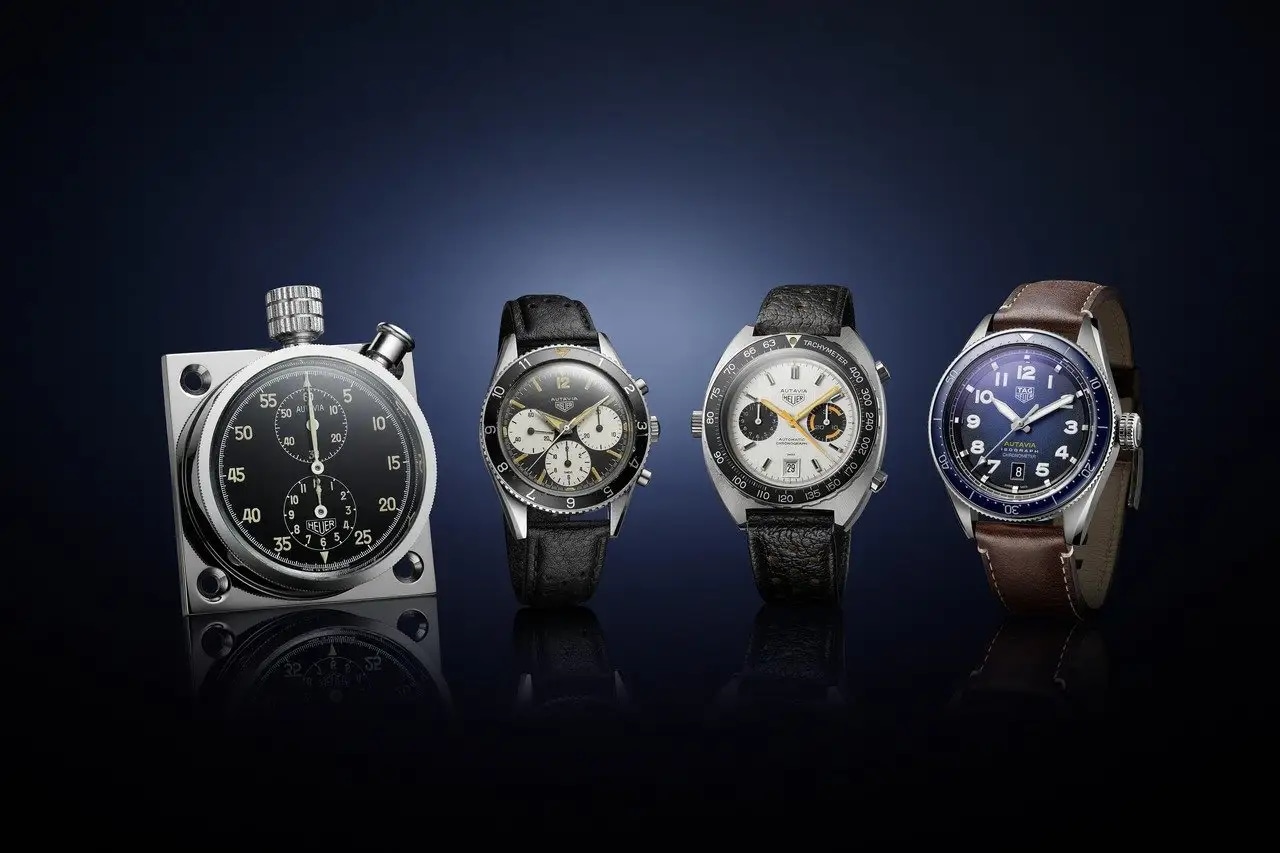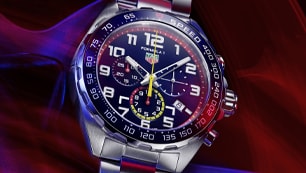TAG HEUER AUTAVIA
Heuer’s introduction of the Autavia chronograph in 1962 was a revolutionary development for the company. In addition to being the first series of chronographs with a model name printed on the dial, the “Autavia” would be defined offering racers and pilots the legibility and rugged construction required for their pursuits. Heuer produced the Autavia for over 20 years, with the model moving through three generations – a round screw-back case; a snap-back compressor case; and a C-Shape case built to house Heuer’s first automatic movement.
As described in the posting covering TAG Heuer’s Re-Edition of the Carrera, the decade from 1985, when the last version of the Autavia was introduced, to 1995 was a period of transformation for TAG Heuer. Dive watches would dominate the TAG Heuer catalog, and TAG Heuer would introduce the Formula 1 collection in 1986 and the S/el (to be renamed, “Link”) in 1987. As these collections became popular, in 1996 TAG Heuer would look back at its classic chronographs from the 1960s and produce a re-edition of the vintage Carrera. This was followed by Heuer’s introduction of a re-edition of the Monaco in 1998.
Seeing the success of the re-editions of the Carrera and Monaco chronographs, in 2003, TAG Heuer proceeded with a re-edition of the Autavia. In this posting, we review the three generations of Autavia timepieces that TAG Heuer has re-issued since 2003. These three generations were introduced by launches of Autavias in 2003, 2017 and 2019


GENERATION ONE -- 2003 TAG HEUER AUTAVIA CALIBRE 11
TAG Heuer launched the first re-edition of the Autavia re-edition in 2003. While the first re-edition of the Carrera in 1996 would match almost every design element of the original model from 1963, TAG adopted a different strategy for the Autavia re-editions. The new Autavia models were more modern interpretations of the key Autavia design features, rather than just copying the old design. The watch had a thinner fixed bezel, rather than the previous rotating bezel, and the round pushers of the historic model made way for a new oblong shape.
There were two stainless steel models, each with two registers (for 30 minute chronograph capacity) with the colorways of these models derived from two of the favorite Autavia references from the vintage Heuer portfolio, one with a white dial and one with a black dial. The white-dialed model (CY2110) incorporated the “Siffert” color scheme, with black registers and blue accents. The black-dialed model (CY2111) drew from a series of Autavia models from the 1970s, with white registers and orange accents.
The third model from 2003 was a limited edition of 150 watches with a rose gold case (CY5140). The caseback was marked to commemorate Heuer’s 70 years of the Autavia, as the name was first used in 1933 for Heuer’s dashboard stopwatch. This gold Autavia added a third recorder for hours, and was chronometer certified.
TAG Heuer created an entirely new bracelet for the 2003 Autavia, giving it a similar look to the original G&F “Grains of Rice” bracelet, but in a much sturdier design. A new movement was developed to power the re-edition of the Autavia, which it called the “Calibre 11”, with the key feature being the location of the crown on the left side of the case.
To launch the watch, TAG also released a limited number of special collector sets that had both a dash timer as well as the watch- playing on the heritage of the Autavia as a timer, not just a Heuer wristwatch. Seventy sets of these were produced in Siffert blue and seventy with the orange accents.
GENERATION TWO- 2017 HEUER AUTAVIA CALIBRE HEUER-02
In 2017, TAG Heuer introduced the second generation re-edition of the Autavia chronograph. The first model to be introduced was the standard production model (CBE2110), and over the years 2017 and 2018, seven additional limited edition or special edition would follow. Accordingly, the line-up of the eight second generation re-editions of the Autavia is as follows:
- 2017 March —standard production model of the Autavia (CBE2110)
- 2017 November — Jack Heuer Limited Edition (CBE2111)
- 2017 November — Limited Edition for the UAE (CBE2113)
- 2018 February — Calibre 11 “Siffert” Limited Edition (CBE2114)
- 2018 February — Harrods Limited Edition (CBE2116)
- 2018 May — “Orange Boy” Edition for Hodinkee (CBE2117)
- 2018 November — “Viceroy” Edition for the United States Market (CBE2118)
- 2018 November — Watches of Switzerland Limited Edition (CBE2115)
Before describing the elements that differentiate these eight models, we will walk through the features that they share. The 2017 re-issue of the Autavia chronograph was the “launch model’ for a new in-house movement developed by TAG Heuer, the Heuer 02. The Heuer 02 movement is a column wheel actuated chronograph with a vertical clutch, that beats at a rate of 28,800 VPH, with a power reserve of 80 hours. The movement has 33 jewels, and measures 31.0 millimeters by 6.95 millimeters.
A key feature of the Heuer 02 movement is that it results in the dial of the chronograph being arranged in the traditional 3-6-9 configuration. The hour register at nine o’clock and the minute register at three o’clock, with running seconds at six o’clock and the date window placed at the bottom of the running seconds register.
Cases are stainless steel, with all surfaces polished. The bezel rotates in both directions, with 60 clicks along the way. The case measures 42 millimeters in diameter, with a thickness of 16 millimeters from the back of the case-back to the top of the crystal, and a measurement of 50.5 millimeters from lug tip to lug tip. The case measures 21 millimeters between the lugs and water resistance is 100 meters.
STANDARD EDITION AUTAVIA (CBE2110)
At Baselworld 2016, TAG Heuer announced that enthusiasts would choose the look of the new Autavia through the “Autavia Cup” competition. Using a head-to-head, knock-out format, participants made their choices from among 16 vintage Autavia references. Voters could make their choices between two registers or three; dials in black or white; and oversized registers (as on the first models) or standard-sized registers (as on the later ones).
The winner of the Autavia Cup was a version of the black-dialed, three-register Autavia produced circa 1967, worn by Formula One champion Jochen Rindt (known to collectors as the “Rindt” Autavia).
JACK HEUER 85TH BIRTHDAY EDITION (CBE2111)
In November 2017, TAG Heuer released a Limited Edition of the new Autavia in honor of Jack Heuer’s 85th birthday. This model had a metallic silver dial, with contrasting black registers, evoking the “Panda” style introduced by Heuer in the late 1960s. The Jack Heuer LE had bright white luminous material on the dial and hands, rather than the aged lume of the standard black model. The solid case-back has the Heuer family shield, along with a reproduction of Jack Heuer’s signature, and the bezel was marked for hours and minutes, following the style of some vintage Autavia models. The Jack Heuer 85th Birthday Edition is limited to 1,933 watches, Heuer’s 1932 birth year plus one additional watch.
LIMITED EDITION FOR THE UAE (CBE2113)
To mark Dubai Watch Week, held in November 2017, retailer Ahmed Seddiqi & Sons created a limited edition of 150 Autavias, that would be available only through TAG Heuer retailers in the UAE. The dial has a soft cream tone, the registers are somewhere between caramel and bronze, and the bezel is a rich shade of brown. The warmth of these elements is complemented by the aged look of the lume on the markers and hands. The chronograph second hand is bright white, and the “needles” on the registers are black.
CALIBRE 11 “SIFFERT” LIMITED EDITION (CBE2114)
With the introduction of the automatic Autavias in 1969, Heuer added an entirely new color scheme – a white dial, black registers, and blue accents used on the dial and – eventually – the hands. Swiss Formula One hero Jo Siffert wore this model, and the entire line-up of these white-dialed models are now known as the “Siffert” Autavias. Over the period from 1969 through the mid-1970s, Heuer produced at least six versions of the automatic “Sifferts”, with three manual-winding models completing the line-up.
In February 2018, the Calibre11 site introduced the “Siffert Edition” of the new Autavia, limited to 100 watches, faithfully incorporating the color scheme of the vintage Siffert models onto the new Autavia. The new Autavia used the white dial, black registers and blue accents of the vintage “Siffert”, with the same balance as on the vintage models. The Siffert connection was reinforced through a reproduction of Jo Siffert’s signature on the sapphire section of the case-back.
HARRODS LIMITED EDITION (CS2116)
In February 2018, Harrods, the London department store, introduced a limited edition of 100 TAG Heuer Autavias (CBE2116). The Harrods Limited Edition was a pure “Panda” version of the new Autavia, having a white dial with black registers, and also used aged-looking lume on the dial and hands. The Harrods LE used the original hour bezel, as on the standard production model.
“ORANGE BOY” EDITION FOR HODINKEE (CBE2117)
In the late 1960s, Heuer used two dominant color combinations for the Autavia – a black-dial, with white registers and red accents (which became the “Viceroy” color scheme) and a white dial, with black registers and blue accents (which was known as the “Siffert” style). In 1971, Heuer broadened its range of colors, and so the black dial of the standard Reference 1163 Autavia was modified, with vibrant orange accents. These accents on the dial included thin lines outside each of the hour markers, and three thick stripes on the chronograph minute recorder (sometimes called “racing stripes”). The orange accents were carried over to the brushed hands, which have orange inserts and orange triangular tips.
The first Autavia to incorporate these elements was the Reference 1163, known among today’s collectors as the “Orange Boy”. These are rare models, with only a handful coming onto the market over the course of a year.
Just as the Calibre11 Siffert LE took the colors of the vintage “Siffert” Autavia and incorporated them into the new TAG Heuer Autavia, in May 2018 the leading publication and retailer Hodinkee released a Special Edition of the Autavia capturing the defining elements of the vintage “Orange Boy”. The watch (CBE2117) had orange accents by the hour markers; orange accents on the hands; orange stripes on the minute recorder. The Hodinkee Orange Boy was the first of the new Autavias to use a Tachymeter bezel, again being consistent with the vintage version of the Orange Boy.
VICEROY EDITION FOR THE UNITED STATES MARKET (CBE2118)
TAG Heuer introduced a model of the Autavia in November 2018, sold only in the United States market, that paid tribute to one of the all-time classic Autavias, the model featured in a promotion with the Viceroy cigarette brand in 1972 (which became known as the “Viceroy” Autavia). The promotion was a huge success for Heuer, not only because of the sale of 5,000 of the watches, but because of the advertisements that Viceroy ran in U.S. magazines.
For the Viceroy Re-Edition, TAG Heuer made a significant change in the design of the Autavia, deleting the running seconds recorder, so that the lay-out of the dial would match the two-register arrangement of the original automatic Autavias. The Viceroy model used the Hour bezel.
WATCHES OF SWITZERLAND LIMITED EDITION (CBE2115)
In November 2018 the Watches of Switzerland stores in Australia introduced a limited edition of 150 Autavias (CBE2115). This version had a midnight blue dial, with aged lume by the markers, and a bright orange chronograph second hand. The black bezel was marked for Hours, as on the standard production Autavia.
GENERATION THREE -- 2019 TAG HEUER AUTAVIA CALIBRE 5
At the Basel Fair in March 2019, TAG Heuer introduced a new version of the Autavia that was different from all the preceding models. Rather than being a chronograph, the 2019 version of the Autavia was a three-hand watch, with a renewed emphasis features that made it ideal for pilots. Yes, with so much focus on the racers and their AUTomobiles, after 57 years it was time for the collection to focus on the AVIAtion heritage of the Autavia.
Legibility was the key feature of the new Autavia, with large Arabic numerals and wide hands both coated with bright white SuperLuminova. The “railroad” track around the dial to mark the minutes, a minutes bezel and an oversized crown completed aviation theme, along with a propeller etched on the caseback. The dials are bright, featuring a gradient finish that was new for the Autavia, and the stainless steel or bronze cases measure 42 millimeters across the dial.
Five versions of the Autavia were introduced in 2019, as follows:
- grey dial, with black ceramic bezel (WBE5110)
- grey dial, with steel bezel (WBE5111)
- blue dial, with blue ceramic bezel (WBE5112)
- green dial, with black ceramic bezel (bronze case) (WBE5190)
- brown dial, with black bezel (bronze case) (WBE5191)









